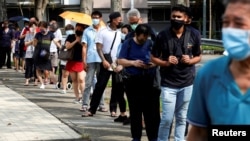A British company says it has developed an easy-to-administer, saliva-based test that can detect whether a person is infectious enough to pass along the coronavirus that causes COVID-19.
The company, Vatic, said in a statement that its test is “extremely accurate” and has not returned a single false positive result in its test group. “This is so important for getting life back to normal,” the company said.
Vatic said its “mission was to design a test that people won’t mind using multiple times a week.”
Tests results are available in 15 minutes, the company said.
The test is not available to the public yet as it undergoes more trials but Vatic is seeking approval for its sale directly to the public.
A report in The Economist says COVID in 2020 has brought an abrupt halt to the steady rise of the rate of lIfe expectancy.
Impact on life expectancy
Researchers in Britain, Denmark and Germany said that between 2019 and 2020 life expectancy dropped in all but two of the 28 countries surveyed.
Life expectancy rose in Denmark and Norway and for women in Finland. Meanwhile, male life expectancy fell by more than a year in Italy, Poland and Spain and fell by more than two years in the United States.
Another report in The Economist says that the death rate from COVID in the U.S. “is about eight times higher in America than in the rest of the rich world” due to vaccine hesitancy and other factors.
The report said, “America’s antipathy to vaccines and continued resistance to other interventions, particularly among Republicans, is worrying. YouGov’s poll indicates that, among those who voted for [former U.S. President] Donald Trump in 2020, 31% say they will not get vaccinated, 71% strongly disapprove of President Joe Biden’s vaccine mandate and nearly 40% never wear a face mask. That remains a deadly combination.”
“The pandemic has destabilized societies, economies, and governments. It has shown that there is no global security without global health security,” World Health Organization Director-General Tedros Adhanom Ghebreyesus said about COVID-19 in a recent address to ambassadors and representatives to the European Union’s political and security committee.
“The fastest and best way to end this pandemic is with genuine global cooperation on vaccine supply and access,” Tedros said. “The longer vaccine inequity persists, the longer the social and economic turmoil will continue, and the more opportunity the virus has to circulate and change into more dangerous variants. We need a global realization that no country can vaccinate its way out of this pandemic in isolation from the rest of the world.”
The Johns Hopkins Coronavirus Resource Center reported Sunday it had recorded 234.6 million global COVID infections and nearly 5 million deaths.
Protests in Romania
Thousands marched Saturday in Bucharest, Romania, to protest restrictions that begin Sunday to combat a jump in coronavirus infections.
The European nation of 19 million is seeing a shocking rise in the daily number of coronavirus cases. A month ago, the number was about 1,000 new cases a day. On Saturday, Romania reported more than 12,500 new cases, its highest number since the pandemic began in March of last year.
Protesters, mostly maskless, gathered outside government offices, shouting "Freedom, freedom without certificates," and "Down with the government," according to Reuters. One sign read: "Green certificates = dictatorship," The Associated Press reported.
The demonstration was organized by Romania's far-right AUR party, the AP said.
The rising cases have strained the nation’s hospitals — intensive care beds are nearly full — and the protests angered some medical workers.
"The situation in hospitals is serious," Beatrice Mahler, hospital manager of Bucharest's Marius Nasta Institute of Pneumology, told The Associated Press. "We have patients hospitalized in beds in the hallway — all with extremely severe forms of COVID-19."
The restrictions scheduled to take effect Sunday include requiring masks be worn in public, and that shops close at 10 p.m. local time.
Public spaces such as restaurants, theaters and gyms, can remain open — some at only partial capacity — for customers who have COVID-19 passes, meaning they are fully vaccinated, or show proof they have had the illness caused by the coronavirus.
Romania has one of the lowest vaccination rates in the European Union, 33.5% of all adults are fully vaccinated, second only to Bulgaria.
There is a weekend curfew in effect for unvaccinated Romanians, and there are plans to make vaccinations mandatory for health care workers, Reuters said.
Since the pandemic began, Romania has recorded nearly 1.25 million cases of COVID-19 and more than 37,000 people have died, according to Johns Hopkins Coronavirus Resource Center.
Some information for this report came from The Associated Press and Reuters.






